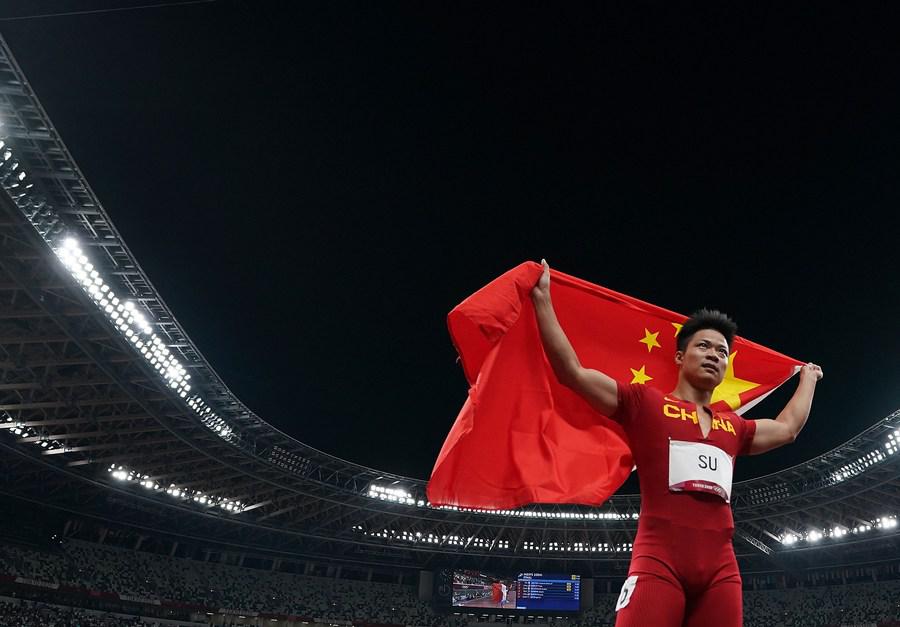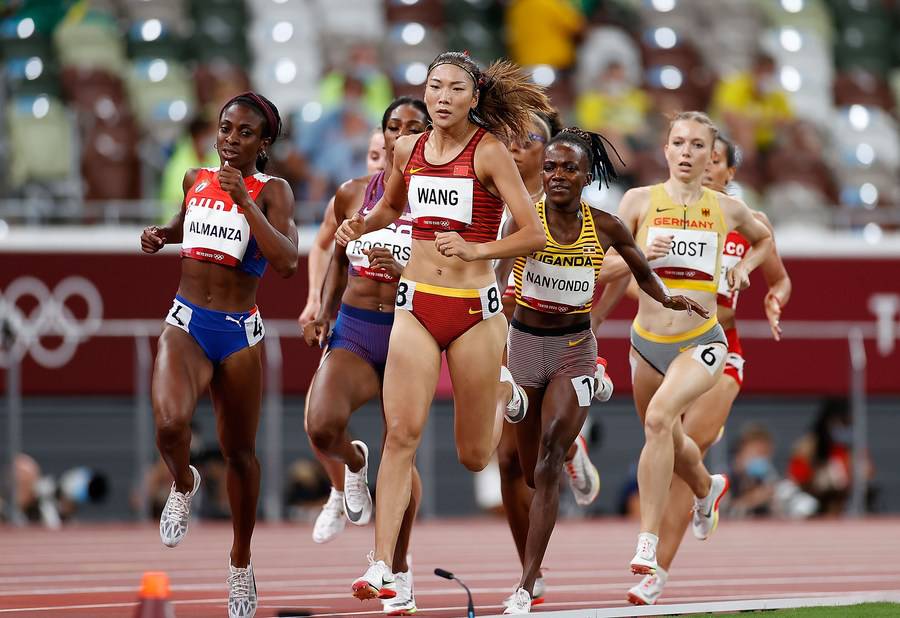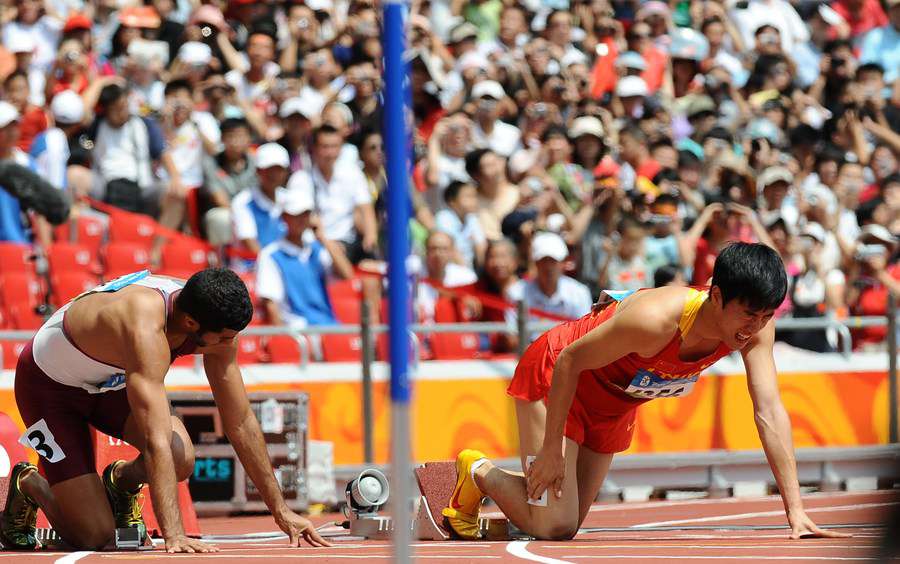Chinese move beyond "gold medal only" mentality
-- Chinese athletes have made breakthroughs from land to water at the Tokyo Olympics, while some teams failed to live up to expectations.
-- For many Chinese, it's not just the gold medals that count, in contrast to the thinking about 'winning or losing' a decade ago.
-- In sport, athletes' hard work, dedication, and tenacity are more valuable and admirable.
TOKYO, Aug. 6 (Xinhua) -- Chinese sprinter Su Bingtian has been hailed as a hero, even though he didn't win medals at the Tokyo Olympics.
The 31-year-old made history on Sunday as he became the first Chinese to qualify for an Olympic men's 100m final, setting a new Asian record of 9.83 seconds in the semifinals.
"Su is the uncrowned king at the Tokyo Olympics," a comment from blogger Bunana said, reflecting a different take on the "win or lose" mentality among Chinese.
While there remains a few who abuse athletes who lose, for many Chinese, breakthroughs deserve a celebration, but the hard work, dedication, and tenacity of athletes is even more valuable and admirable.
But it was quite another story just a decade ago when Chinese Olympians often found that they had extra judges outside of the arena: their compatriots at home and online.

Su Bingtian of China celebrates after the men's 100m final at the Tokyo 2020 Olympic Games in Tokyo, Japan, Aug. 1, 2021. (Xinhua/Lui Siu Wai)
Su Bingtian's remarkable run in Tokyo reminded many Chinese of the hurdler Liu Xiang, the former "Flying Man" who became the first-ever Chinese male athlete to claim an Olympic gold medal in track and field when he equaled the then-world record to win the 110m hurdles in Athens 2004.
But Liu fell victim to harsh abuse online after pulling out of the Olympic race with injury on home soil in 2008 and again in London four years later.
Yet this time, after Liu sent his congratulations to Su, some Chinese web users said, "we owe Liu Xiang an apology." In two days, Liu's latest post on Weibo garnered more than 60,000 comments.
"You are our hero. We will always remember you running with our national flag draped over shoulders," one comment said.
Not coincidentally, Chinese gymnast Xiao Ruoteng said to his compatriots on social media that "You are becoming more tolerant and united," after China, the pre-Olympics title favorite in the men's gymnastics team event, finished only with a bronze medal.

Xiao Ruoteng of China prepares before the parallel bars competition of the artistic gymnastics men's all-around final at the Tokyo 2020 Olympic Games in Tokyo, Japan, July 28, 2021. (Xinhua/Cao Can)
NOT JUST GOLD THAT COUNTS
The past fortnight has witnessed Chinese athletes make breakthroughs from land to water at the Tokyo Olympics.
Four Chinese swimmers smashed the previous world record by 1.17 seconds in women's 4x200m freestyle relay on July 29, snatching the country's first gold medal in swimming relay events.
The next day, Wang Shun broke the dominance of U.S. swimmers in the men's 200m individual medley, clocking an Asian record time of one minute and 55.00 seconds to win China's first men's individual medley title.
But, for many Chinese, it's not just the gold medals that count.
Chinese young swimmer Li Bingjie, 19, beat her personal best in women's 400 meters freestyle heats and set a new Asian record. Competing with world-leading swimmers such as Katie Ledecky and Ariarne Titmus, she managed to gain the bronze. "Bravo! Well swam! Salute to you for your courage and going all-out," a home fan wrote on social media.

Li Bingjie of China competes during the women's 400m freestyle heat of swimming at the Tokyo 2020 Olympic Games in Tokyo, Japan, July 25, 2021. (Xinhua/Ding Xu)
On Tuesday, Wang Chunyu became the first Chinese runner to reach the Olympic women's 800 meters final, where she eventually finished fifth and improved her personal best by more than two seconds.
"You were already a victor when you were standing on the track for the final," said a netizen following Wang's post on Sina Weibo, China's equivalent of Twitter.
He was among more than 2,000 who left messages online to greet and comfort Wang after the 26-year-old shed tears for failing to make the podium. After watching the competition, many people said to Wang: "you are the best," and "we are proud of you."

Wang Chunyu (front) of China competes during the women's 800m semi-final at the Tokyo 2020 Olympic Games in Tokyo, Japan, July 31, 2021. (Xinhua/Wang Lili)
After a surprising elimination from the knock-out stage with three straight defeats in Tokyo, understanding and support also went to the much-loved Chinese volleyball team.
Among the flood of supportive messages on Weibo, one post read: "I admire those who endure hardship and the passion the volleyball players devote to the game more than the gold medal."
Chinese star player Zhu Ting was seen with her right wrist bandaged and having difficulty spiking the ball during the team's first two games.
"Standing on the podium or not really does not matter," another user wrote. "We love the Chinese volleyball team because of not only their successful history but also their fighting spirit. I hope those who suffer from severe injuries, like Zhu Ting, can get some rest."
Moreover, another Chinese took the privilege of being at the volleyball court -- the Ariake Arena to speak for many.
After the Chinese team's last match against Argentina on Monday afternoon, the volleyball hall resonated with a voice in Mandarin. "Although the Chinese team's Olympic campaign is over, we'll always support the team. Thank you, coach Lang Ping. We love you."
Then a song titled "Sunshine after the Rain," the "unofficial team song" of the Chinese women volleyballers, was played with many TV audiences back in China moved to tears as the girls bowed to and hugged their head coach Lang Ping one by one.

Lang Ping (c), China's head coach, watches the women's volleyball preliminary match between China and Argentina at the Tokyo 2020 Olympic Games in Tokyo, Japan, on Aug. 2, 2021. (Xinhua/Li Ga)
It was broadcast by Li Helin, a Chinese expat who worked for the Tokyo Olympics as a master of ceremonies. "They fought against injuries and psychological pressure. They lost in important matches, but they've tried their best," Li said.
"That's one of the most emotional scenes at the Tokyo Olympics, which I may remember for a lifetime," said Luo Lijuan, a market consultant based in Shanghai. "And I wanna say 'thank you' to the MC. He did such a lovely thing in such a subtle and considerate way that offered timely comfort to the team."
The 41-year-old Luo noticed the changing attitude of the Chinese society toward the athletes' performances.
"The changes are happening in myself too," she said.
"Nowadays, we do appreciate the sport's elites and value their work, but we also enjoy the fun of sports can bring. It's for everybody, not for a few. We, ordinary Joes, can take inspiration from their spirit, not their medals, right?" she said.

China's Liu Xiang (R) reacts on the starting line during the first round competition of men's 110m hurdles at the National Stadium during the Beijing 2008 Olympic Games in Beijing, China, Aug. 18, 2008. (Xinhua/Chen Kai)
MENTALITY CHANGE REFLECTS SOCIAL PROGRESS
According to Sun Yingchun, a professor at China's Communications University, there are various reasons behind the Chinese people's mentality change.
"First of all, people have more channels than the traditional media to learn about different aspects of the athletes and the Olympic events," he told Xinhua.
Also, as China develops, people are naturally becoming more confident. "Media are taking a more rational view toward sports events," he said.
Finally, he noted that ordinary people are more pragmatic and calm when watching sports competitions.
"Enjoying the Olympics and appreciating the athletes, rather than just focusing on the number of gold medals, this is big progress for our society," he concluded.
Photos
Related Stories
- American Ross/Klineman win women's beach volleyball gold at Tokyo Olympics
- China wins fourth straight women's team gold in Olympic table tennis
- Italy's Stano wins men's 20km race walk at Tokyo Olympics
- China makes progress in Olympic track and field, USA bows out of men's 4X100 relay final
- Spanish climber Gines Lopez wins first-ever sport climbing Olympic gold in Tokyo 2020
Copyright © 2021 People's Daily Online. All Rights Reserved.










